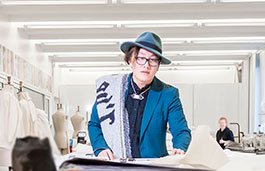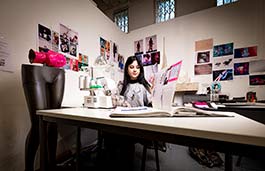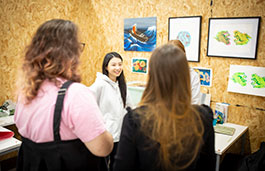Search
International Fashion Business BA (Hons)
Study level: Undergraduate
From trends to trade: explore the global fashion industry, gain insights into international markets and build creative and business skills for a dynamic career in fashion.
Course features
Year of entry
2026-27
Location
Coventry University (Coventry)
Study mode
Full-time
Sandwich
Duration
3 years full-time
4 years sandwich
Course code
W23B
Start date
September 2026
November 2026
January 2027
March 2027
May 2027
July 2027
Course overview
If you're passionate about fashion, business and global trends, get the skills, insight and industry knowledge to launch a career in the international fashion market, from brand management to buying and retail strategy.
- Learn how fashion brands grow, market and operate worldwide.
- Explore sustainability, innovation and digital trends shaping the industry.
- Get hands-on experience for a fast-moving career in fashion buying and management.2
Rated Gold Overall
Teaching Excellence Framework (TEF) 20235 QS Stars for Teaching and Facilities
QS Stars University RatingsTop 5 Student City in England (Coventry)
QS Best Student Cities Index 2026Why you should study this course
- Explore global fashion markets through modules focused on international branding, buying and retail strategy.
- Gain practical experience by working on live industry projects and case studies as part of your assessed coursework.2
- Enhance your global outlook with the option to study or work abroad through our international exchange and placement opportunities.2
- Learn from staff with experience in fashion marketing, brand development and international business (staff may be subject to change).
- Access specialist facilities, including trend forecasting tools, digital marketing software and resources within Coventry University's creative hub.4
About the School of Arts and Creative Industries
- Our hands-on, practitioner-led approach is rooted in project-based learning. This creates opportunities for cross-disciplinary working and engagement with external collaborators. Where appropriate, you may work with peers from other courses, bringing specialist skills to interdisciplinary projects in ways that reflect the collaborative nature of creative studios and agencies in the creative industries.
- Our learning and teaching mirror the needs of the creative industries, so our graduates have the opportunity to develop the skills and attributes needed to become industry specialists, leaders and innovators.
- Our studio culture seeks to ensure you are socially responsible in our creative community and develop critical thinking in research and making processes.
- Our global initiatives aim to give you skills to become a collaborative communicator and make you culturally competent.
- Our excellent industry links typically enable us to host an exciting programme of guest speakers covering topics, such as fashion merchandising, sustainability in practice and fashion journalism.2
- Past students have worked on projects as diverse as sportswear design for Reebok and jewellery design for Tatty Devine.
For Fashion and Textiles
The Guardian University Guide 2025
Learn more about Graduate Fashion week which attracts Industry and International audiences from across the world. Find out more here
Graduate Showcase 2025
Check out what our School of Arts and Creative Industries students produced for their final projects to showcase at Coventry University's Graduate Festival.
Attended by hundreds of industry professionals, family and friends, across multiple weeks, our students' work was showcased at our very own Phoenix Film Festival, live performances from our theatre and music students and an on-campus exhibition.
What you'll study
We regularly review our course content, to make it relevant and current for the benefit of our students. For these reasons, course modules may be updated.
How you'll learn
Teaching and learning methods may include:
- lectures
- seminars
- tutorials
- presentations
- group projects
- workshops
- practical studio sessions
- practical workshop sessions.
Teaching contact hours
As a full-time undergraduate student, you will study modules totalling 120 credits each academic year. You will normally study one 30-credit module at a time. A typical 30-credit module requires a total of 300 hours of study made up of teaching contact hours, guided and independent study.
Teaching hours
Teaching hours may vary depending on your year of study and selected modules. During your first year, you can expect 12-15 teaching hours each week. You will also have the option to attend additional sessions, including time with a progress coach or to meet with staff for advice and feedback. As you progress through your studies, teaching hours may reduce.
Guided and independent study
Throughout your studies, you will be expected to spend time in guided and independent study to make up the required study hours per module. You’ll be digging deeper into topics, review what you’ve learned and complete assignments. This can be completed around your personal commitments. As you progress through your studies, you’ll spend more time in independent study.
Online learning
As an innovative university, we use different teaching methods including online tools and emerging technologies. So, some of your teaching hours and assessments may be delivered online.
Assessment
This course is assessed using methods that vary by module. These approaches are intended to prepare you for the complex and evolving contexts of professional practice.
Assessment methods may include:
- artefacts
- practical coursework
- digital coursework
- individual work
- group work
- live/poster presentations
- reports
- projects
- individual assignments.
The Coventry University Group assessment strategy ensures that our courses are fairly assessed and allows us to monitor student progression towards achieving the intended learning outcomes.
Entry requirements
Typical entry requirements:
Fees and funding
| Student | Full-time | Part-time |
|---|---|---|
| UK, Ireland*, Channel Islands or Isle of Man | 2026/27 fees TBC 2025/26 fees: £9,535 per year |
Not available |
| EU | 2026/27 fees TBC 2025/26 fees: £9,535 per year with EU Support Bursary** 2026/27 fees TBC 2025/26 fees: £19,850 per year without EU Support Bursary** |
Not available |
| International | 2026/27 fees TBC 2025/26 fees: £19,850 per year |
Not available |
If you choose to study this course with a professional placement2 or study abroad year, you will need to pay a tuition fee3 to cover your academic support throughout your placement year. Students commencing their professional placement in the academic year 2027/28 will pay £1,500 if they are paying UK fees, or £1,800 if they are paying international fees.
For advice and guidance on tuition fees and student loans visit our Undergraduate Finance page and see The University’s Tuition Fee and Refund Terms and Conditions.
The University will charge the tuition fees that are stated in the above table for the first Academic Year of study. The University will review tuition fees each year. For UK (home) students, if Parliament permits an increase in tuition fees, the university may increase fees for each subsequent year of study in line with any such changes. Note that any increase is expected to be in line with inflation.
If you choose to study this course with a professional placement, the University will charge the tuition fees stated above for those on a placement during Academic Year 2027/28. The University will review professional placement tuition fees each year. For UK (home) students, the University may increase fees for each subsequent year of study, but such that it will be no more than 5% above inflation.
For international students, we may increase fees each year, but such increases will be no more than 5% above inflation. If you defer your course start date or have to extend your studies beyond the normal duration of the course (e.g. to repeat a year or resit examinations) the University reserves the right to charge you fees at a higher rate and/or in accordance with any legislative changes during the additional period of study.
We offer a range of International scholarships to students all over the world. For more information, visit our International Scholarships page.
Tuition fees cover the cost of your teaching, assessments, facilities and support services. There may be additional costs not covered by this fee such as accommodation and living costs, recommended reading books, stationery, printing and re-assessments should you need them. Find out what's included in your tuition costs.
The following are additional costs not included in the tuition fees:
- Any optional overseas field trips or visits: £400+ per trip.
- Any costs associated with securing, attending or completing a placement (whether in the UK or abroad).
Other additional costs
- Any optional specialist supplies, such as materials, or equipment not supplied by the course.
*Irish student fees
The rights of Irish residents to study in the UK are preserved under the Common Travel Area arrangement. If you are an Irish student and meet the residency criteria, you can study in England, pay the same level of tuition fees as English students and utilise the Tuition Fee Loan.
**EU Support Bursary
Following the UK's exit from the European Union, we are offering financial support to all eligible EU students who wish to study an undergraduate or a postgraduate degree with us full-time. This bursary will be used to offset the cost of your tuition fees to bring them in line with that of UK students. Students studying a degree with a foundation year with us are not eligible for the bursary.
Facilities
The Delia Derbyshire building lies at the heart of our Coventry city campus. First opened to students in 2023, the spaces enable you to mix with like-minded students, getting hands-on with cross-disciplinary projects or immersing yourself in the studios with cutting-edge virtual reality and mixed-reality technologies. Our aim is to bring you sector-leading facilities helping you explore your way to your future career4.
Our digital and industrial workshops are of industry-standard quality and house 3D rapid prototyping, laser cutters and milling machines. These facilities are available to all students on our courses at no extra cost.
Take a virtual tour
Facilities are subject to availability. Access to some facilities (including some teaching and learning spaces) may vary from those advertised and/or may have reduced availability or restrictions where the university is following public authority guidance, decisions or orders.
Careers and opportunities
Employability and graduate skills are of paramount importance throughout this industry-focused course. The course has been developed with graduate goals and destinations in mind, beyond undergraduate academic success, to help ensure graduates are industry-ready.
The optional sandwich year is a real, focused opportunity to gain industry experience and helps refine your graduate goals and ensure a clear direction for your return to studies.2
Where our graduates work
Previous alumni from our suite of fashion courses have undertaken placements at companies including Francesca Casrellano, MR MARVIS, Ralph Lauren, Common Objective, BStyle Studio, Adidas, Karl Lagerfeld, Sainsbury’s TU, The Future Laboratory, Calvin Klein, POP Magazine, Vogue, Iris Van Herpen, WGSN and Bottle Blonde.
The graduate destinations listed above illustrate potential career paths. You may need to gain additional qualifications or practical experience, pass professional examinations, complete training, cover associated costs and meet specific visa or immigration requirements to secure employment in these fields.

Discover Phoenix+
Phoenix+ brings you together with other students to learn, experience and develop essential knowledge and skills. Whatever destination you choose, it's about preparing you for life after university.
Learn more about Phoenix+How to apply
You may also like

Fashion BA (Hons)






